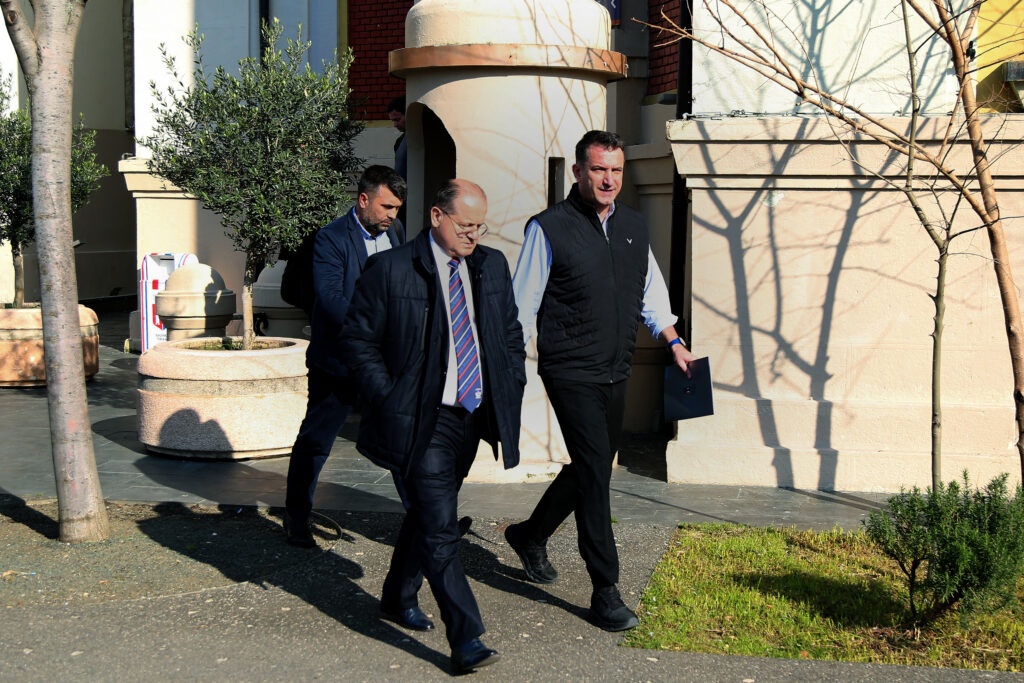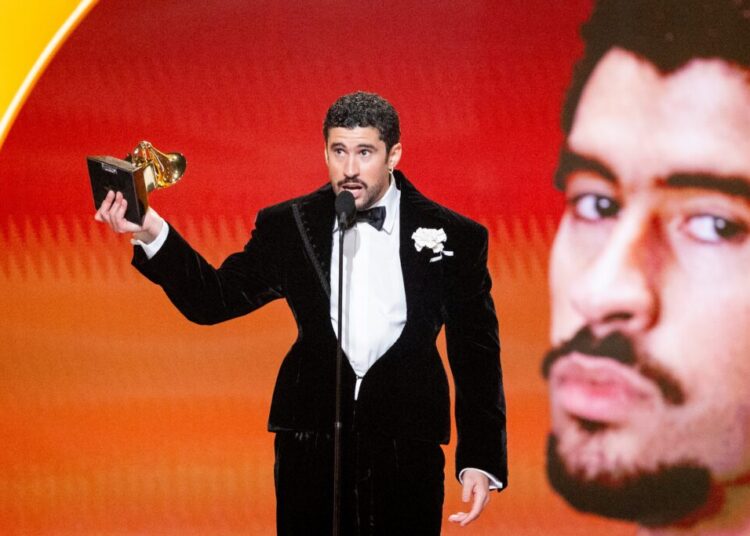In a handwritten note, the democratically elected mayor of the capital of Albania confessed that it is hard to do his job: He has been locked in a prison cell for the past nine months.
Erion Veliaj was — and perhaps still is — a powerful politician in Albania’s ruling Socialist Party. As a former social activist and the popular mayor of Tirana, he might have followed his predecessors to become prime minister or president. Instead, his future is cloudy, to say the least.
Veliaj, 45, was arrested in February and charged in July with corruption, money laundering and concealment of wealth. Now, he is reduced to communicating with his supporters through letters ferried by his family. But he is not without resources. He also has a team of PR consultants and lawyers in London and Washington.
The thrice-elected mayor is one of several top officials in Albania and neighboring countries who are being pursued by aggressive new prosecutors, part of an ambitious attempt to reform the justice systems in countries seeking to join the European Union.
The wild ride in Albania shows the challenges. Veliaj remains mayor. He also remains in jail awaiting trial. An election to replace him was canceled by the Constitutional Court.
On one level, the muscular prosecution of sitting politicians demonstrates that no one is above the law, in a country notorious for organized crime and shady dealings. But to defendants like the Tirana mayor, the special prosecutors are an “unelected, untouchable” force, he said, with “unchecked and unaccountable powers” — a “Balkan Frankenstein.”
In a letter to his supporters, he compared the investigation into his affairs to a colonoscopy and asked: “What drug lord has been subjected to this? Which serial killer has seen their entire family and network dragged into an investigation?”
Asked if he can perform his official duties, Veliaj replied, “barely.” Asked why he was detained and not free on bail while awaiting trial, one of his legal advisers confirmed that prosecutors view him as a flight risk.
“I mostly read and write in my cell, no internet, no computer to read my case, limited phone calls to wife and mother,” Veliaj wrote in answer to questions from The Washington Post, passed along by his brother. Veliaj said that prosecutors have denied his requests to meet with municipal officials, as well as with international counsel. He denies any wrongdoing. “These charges are a complete joke,” he wrote.
As the E.U. works to bring more countries into the 27-nation bloc, Albania has emerged as a top candidate, alongside little Montenegro, which is probably the furthest along and could be admitted as early as 2028. The last country to join was Croatia in 2013.
Also in negotiations for membership: North Macedonia, Moldova, Bosnia, war-torn Ukraine, currently under martial law, and Serbia.
Turkey’s bid is essentially frozen because of democratic backsliding under President Recep Tayyip Erdogan. Talks with Georgia are at a similar standstill.
To get into the club, countries must achieve E.U. standards of government competence, transparency, and fairness, and must prove to Brussels that they run clean elections, protect human rights and prosecute corruption. Public corruption remains a huge challenge.
The candidate nations often complain of hypocrisy, noting that founding E.U. countries like France are hardly immune from public graft and often take a laissez-faire approach.
While Ukraine dominates headlines, the other candidate countries are struggling to fight high crimes in high office. Moldova recently introduced new protections for whistleblowers. North Macedonia has new transparency rules to let citizens scrutinize who serves on government committees.
With the help and backing of the United States and E.U., Albania created an independent body responsible for investigating and prosecuting high-level corruption, organized crime and terrorism, known as the Special Prosecution Against Corruption and Organized Crime court, or SPAK, which became operational in 2019.
The special prosecutors have gone after some of the country’s most powerful figures, including Deputy Prime Minister Belinda Balluku, indicted earlier this month for allegedly helping rig a multimillion-dollar tender for the construction of the Llogara Tunnel, an expensive infrastructure project.
Balluku serves beside the country’s longtime and colorful prime minister, the artist Edi Rama, who is pushing the E.U. to allow Albania into the fold.
“Before people thought Albania was this [hell]hole in the middle of Europe, now they see it’s part of the European mosaic,” Rama said in a television interview with Euronews in Brussels. “Do we have problems with organized crime? Yes, but who doesn’t?”
“Look at this city,” he said, referring to the E.U. capital. “That’s another example. But there are also great things.”
Balluku continues to serve in office and has denied the charges. She is not the only big fish in the net.
In May, the SPAK prosecutors indicted Ilir Meta, a former president and prime minister, on corruption, money laundering and tax evasion charges — in deals involving a luxury villa and Beyoncé tickets. Meta denies the charges and blasted the prosecution, calling his arrest an “abduction” by a “dictatorial regime.”
Then there’s Sali Berisha, 81, a former prime minister and leader of the opposition Democratic Party, who was put under house arrest and then charged in September 2024 by SPAK with “passive corruption” — for allegedly helping his son-in-law benefit from the privatization of land expropriated during the Communist era. Berisha denies wrongdoing and called his prosecution politically motivated.
Mayor Veliaj, who sits in a prison cell 35 miles from his office at city hall, is accused of running a complex scheme involving bribes and money laundering through a network of NGOs and companies controlled by his wife and brother.
In September, the Tirana City Council sought to oust Veliaj from office, saying he had been unable to perform his duties because he was behind bars.
An election was set for early November. Candidates stepped forward, including the satirist Florjan Binaj, one of the country’s best-known TV actors, famous for wicked impersonations of Rama, the prime minister. Binaj told The Washington Post that he was running to improve quality of life for ordinary citizens.
Veliaj fought to keep his job and, in a surprise ruling earlier this month, the Constitutional Court overturned the Tirana City Council’s decision, reinstated him as mayor and halted the planned elections.
Veliaj’s legal team hailed this as a pivotal moment for democracy in Albania, reaffirming the constitutional principle that an elected official’s mandate cannot be terminated without due process.
Celia Marr, one of Veliaj’s legal advisers in London, said he should be released to return to his official duties while fighting the charges in court. “He is very keen to return to full active duties as mayor,” Marr said.
Appearing before the Constitutional Court last month, Veliaj said: “You can imprison a person, but not their truth. And the truth is that my absence has not been a choice, but a consequence of an isolation imposed by the state, through a disproportionate decision … which deprived me not only of my freedom, but also of my city, before any guilt was proven.”
Asked by The Post if it wouldn’t be better to resign and fight his criminal case, Veliaj said no. “That would set a standard where every official can be targeted by phony charges and betray the trust of voters to serve and deliver,” he said.
Lutfi Dervishi, a political analyst in Albania, said “the city is in limbo” but that the E.U. was likely to look past the chaos and see that the justice system is functioning. Prosecuting top politicians shows “the end of impunity, the touching of the once untouchables,” Dervishi said, just as the ruling by the Constitutional Court shows respect for the rights of the accused.
Afrim Krasniqi, head of the Albanian Institute for Political Studies, said that the special prosecution court “is the only clearly visible achievement of the reforms in Albania in relation to the E.U. integration process, and at the same time one of the few institutions not under political or governmental influence.”
Krasniqi said that although it is an instrument created by the United States and the E.U., “SPAK is also the most trusted Albanian institution among the public, far more than the parliament, the government, political parties, or the judicial system as a whole.”
“For the first time in our history,” he said, “the highest-ranking officials are under investigation or indictment for corruption, an indicator both of the high level of corruption and of SPAK’s courage to enforce accountability through the law.”
Sinoruka reported from Tirana.
The post Albania is fighting corruption. The accused are fighting back. appeared first on Washington Post.




